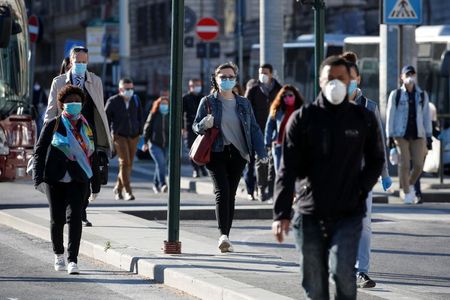(Reuters) – Here’s what you need to know about the coronavirus right now:
Post-pandemic workspace makeover
As lockdowns are gradually lifted and people anticipate returning to offices, many wonder what the post-pandemic workspace will look like.
Occupational experts say one-way corridors, buffer zones marked out by coloured carpet or tape around desks, and clear plastic screens to guard against colleagues’ coughs and sneezes may become the norm.
The changes could be hard to adapt to, and could have a negative impact on employee well-being, said organizational psychologist Brad Bell.
Remdesivir pricing
Beximco Pharmaceuticals, one of Bangladesh’s largest drugmakers, will start this month to make the experimental antiviral drug remdesivir, which has shown promise in fighting the virus.
In a first cost indication, the company plans to price each vial between $59 and $71, Beximco’s Chief Operating Officer Rabbur Reza told Reuters, adding that a patient might need anywhere from five to 11 vials.
Gilead’s remdesivir patent in theory means it has exclusive rights to make it, but global trade rules allow nations defined by the United Nations as least-developed countries, including Bangladesh, to ignore such patents and make drugs more affordable in those markets.
Bangladesh would then be allowed to export the drug to other least-developed countries, though Reza stressed Bangladesh would get first priority.
Pakistanis testing positive on repatriation
Many Pakistani citizens being repatriated from the United Arab Emirates are testing positive for the virus on arriving home, officials said on Tuesday.
The UAE government rejected the claim, saying everyone was tested before departure, with those found infected not being allowed to travel.
About 12% were testing positive on most flights, but on a couple, the proportion rose to between 40% and 50%.
“The hypothesis is that a lot of the labourers live in crowded dormitories and in those, essentially, it’s easier to infect each other,” Moeed Yusuf, a prime ministerial special assistant on national security, told Reuters.
Llama nanobodies
A llama called Winter could prove useful in the hunt for a virus treatment, say U.S. and Belgian scientists who have identified a tiny particle that appears to block the coronavirus.
The llama in Belgium is central to the studies of the scientists, from the country’s VIB-UGent center for medical biotechnology and the University of Texas at Austin, who published their research on Tuesday in the journal Cell.
Llamas and other members of the camel family are distinct in creating standard antibodies and smaller antibodies called nanobodies, with which scientists can more easily work.
The team aims to begin animal tests, with a view to allowing trials with humans to begin by the end of the year. Saelens said negotiations were under way with pharmaceutical companies.
(Compiled by Karishma Singh; Editing by Clarence Fernandez)


